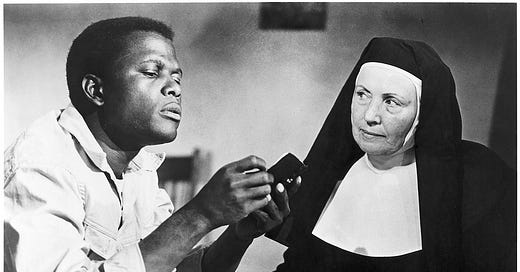100 Movies Every Catholic Should See #16: Lilies of the Field (1963)
Directed by Ralph Nelson. Written by James Poe. Starring Sidney Poitier, Lilia Skala, Stanley Adams, and Dan Frazer.
Hello everyone! Joe Wilson here. We have a very special guest post this week from Kevin Chan of The Searchers Podcast! Kevin is a good friend and an excellent writer on Letterboxd, and The Searchers is a great podcast where the hosts discuss lesser known or overlooked films from all eras of film history. I joined them this week to discuss Lilies of the Field, a wonderful gem from the early 1960s. You can check that conversation out here, and you can follow The Searchers on Spotify, Podbean, Google, and Apple Podcasts!
Mr. Ashton: Say, uh, where'd you get all the material?
Juan: The people give them, Señor.
Mr. Ashton: What for?
Juan: A man, he gives wood. Bricks. His time. What does he get? A chapel. A place where his children can receive the sacraments. To these men, for their children to have faith, it is important.
Mr. Ashton: Is that why you're here?
Juan: To me, it is insurance. To me, life is here on this earth. I cannot see further, so I cannot believe further. But, if they are right about the hereafter, I have paid my insurance, Señor.
It isn’t of sheer importance to other Christian religions, but in Catholicism, the reason for the Mass isn’t merely to hear scripture or listen to the priest’s homily, but to witness the consecration of and to receive the Eucharist — Christ’s Body and Blood in the form of unleavened bread and wine. It’s reliving the Last Supper in the celebration that unites Heaven and earth. After consecration, the priest recites the words, “the Mystery of Faith.” What does that mean? It is a statement that is not limited to the Real Presence of Christ in the Eucharist but to the whole mystery of salvation through His death, resurrection, and ascension — events of which are made present at the celebration of the Eucharist. Faith, as staunchly rooted in such a holy sacrament, can be difficult to come by for the masses. But then again, faith in anything can be hard to come by, as it’s hard to have that quality when mired in our own human flaws of sin and doubt. Even then through such faith is the strength of prayer. In this 1963 filmic bundle of sweetness, the complete trust in others such as that of these two unlikely individuals are compulsory for a particular undertaking to ever come to fruition. The power of unabashed faith is strong… and truly a mystery.
While driving through the barren Arizona desert in search of water for his car, young and strong Homer Smith (Sidney Poitier), a Baptist, encounters five Catholic nuns living humbly in the heat. The sisters speak very little English, except for Mother Maria (Lilia Skala) who somehow convinces Homer, aching to leave once he gets his water, to fix the roof of their abode. With the expectation to be paid for his services, Homer is persuaded again to stay to build the nuns a chapel. The two strong personalities butt heads through scripture and language barriers, and enjoy each other’s company through song and… language barriers. But even then, both individuals find their way to helping each other fulfill their prayers and dreams with that sheer mystery of faith.
As opposed to other films that enable the balance of an artist’s direction with thematic material, Lilies of the Field’s charm relies solely on its themes and the rather calming screen presence of Sidney Poitier and his chemistry with Lilia Skala and the rest of the nuns. Direction and cinematography aren’t high marks, with the only magnetic scenes being relegated to Homer and the nuns conversing at the dinner table and the solemnity of Homer placing the cross on the spire as well as the scenes building towards the film’s conclusion. Sidney’s Homer and Lilia’s Mother Maria quote scripture to each other in one scene, attempting to justify each other’s motives — the man desires to be paid and move on, while the nun wants him to stay and build her chapel.
It isn’t part of the film, but one portion of scripture that came to mind, while mindlessly scrolling through Instagram post-watch happened to be Matthew 10:19-20…
“But when you are handed over, do not worry about how to speak or what to say; what you are to say will be given to you when the time comes, because it is not you who will be speaking; the Spirit of your Father will be speaking in you.”
Sure, maybe this could be reaching, but throughout the film, Mother Maria and the rest of the nuns struggle with their own words — learning how to communicate with not only Homer, but the community in the town to which they were assigned. Similarly, Homer struggles a bit himself — learning how to get through to the nun and wondering if she actually understood his wish to leave or is completely ignoring him. On top of praying for someone to help them build a house of worship and the answer to their problems arriving in the form of Homer Smith, the nuns write letters to multiple charities and organizations asking for building materials. But they’re all denied. As the narrative rolls along, viewers discover Homer’s longstanding wish to become an architect, but cannot due to his inability to afford schooling. Additionally, a shepherd tending to the town’s sheep, Father Murphy (Dan Frazer), reveals his own wishes…
Fr. Murphy: She also tells me you’re gonna build her a chapel.
Homer: She asked me. But you know how it is. I’ve got other fish to fry.
Fr. Murphy: Well, she believes there was a need. She put her trust in prayer. When I was ordained, how I prayed. How I prayed for a call to a great, majestic cathedral in some wealthy diocese.
Despite setbacks that come their way (especially in communication), the working nomad and the stolid sister somehow answer each other’s prayers. Through the grace of the Lord as their witness, Homer puts his architect skills to the test by building a humble little chapel while Mother Maria has that chapel built for the purpose of honoring Him. And through the prayers of two people with big dreams, there stands the majestic cathedral with a wealth of parishioners for Father Murphy who just as well always put his trust in prayer. Once it all is finished, the two strong personalities understand each other, sealed in one of the little English lessons as taught by Homer towards the nuns…
Homer: [the final English lesson] Oh, I built a chapel...
All sisters: I built a chapel.
Homer: You built a chapel...
All sisters: You built a chapel.
Homer: We built a chapel...
Mother Maria: [points to heaven] HE built a chapel.
Homer Smith: [pause, then] Amen.
The beauty of Lilies of the Field lies within not only the idea of not worrying, but in holding steadfast to faith. Not through wallowing in despair, but in transferring that energy to prayer, and the sheer trust that life just works its way out in the end, whether one feels his or her words aren’t strong enough or understandable. With that mystery of faith, the prayers of Homer, Mother Maria, and Father Murphy have been answered in the form of a loving chapel wherein the true mystery of faith is rooted.
“… what you are to say will be given to you when the time comes, because it is not you who will be speaking; the Spirit of your Father will be speaking in you.”
— Matthew 10: 19-20







I just read the short novella upon which this film was based. excellent. By William Edmund Barrett.